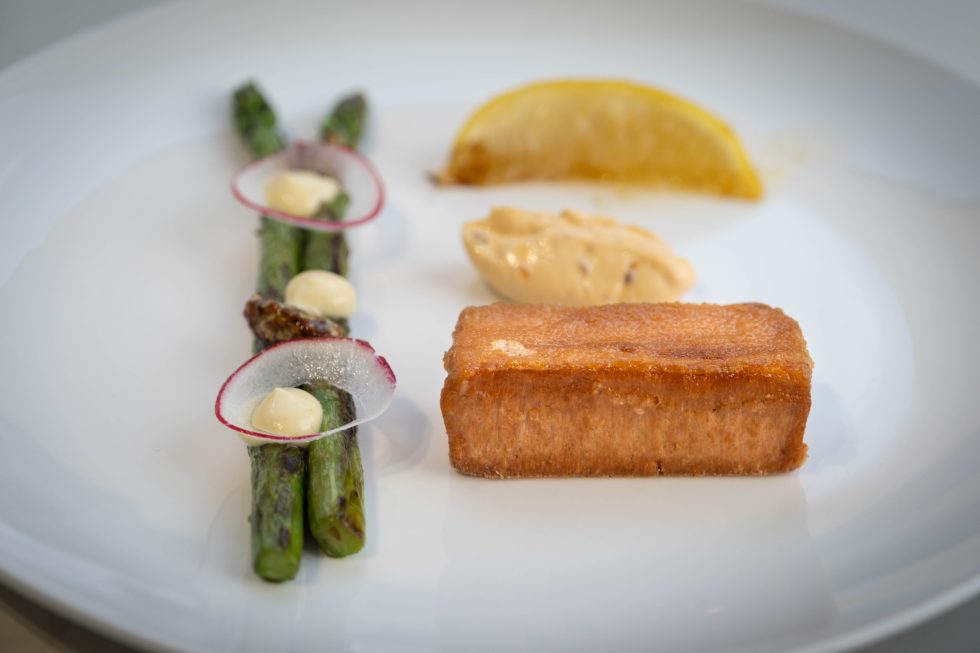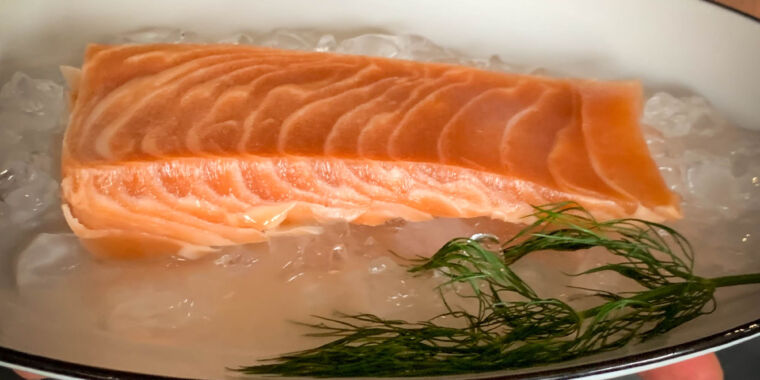New School Foods
I could count on one thing as I sat down for a multiple-course meal based on something that looked very much like salmon: I would not have to worry about any bones. The plant-based theme ingredient came from a Toronto startup called New School Foods that has been developing a way to construct a salmon substitute with not just the taste but also the texture of the real thing.
New School treated a table’s worth of journalists to a tasting dinner in Toronto in late June—subject to a no-food-photos rule for attendees but with no restrictions on taking notes. That comped meal came hours after CEO Chris Bryson gave his sales pitch for the company during a panel at the Collision conference there, in which he said that New School’s goal was to see its products “enthusiastically adopted by non-vegans.”
New School has given itself a tall order by making salmon its go-to-market product. Salmon both has a distinctive, delicate texture and one of the most identifiable flavor profiles among seafood. And people prepare it with a wider range of techniques than most kinds of meat allow—grilling, poaching, sautéing, smoking, roasting, or even not cooking it at all. For plant-based salmon to pass muster, it has to work across those use cases.
New School says that its “scaffolding” technology, developed at Toronto Metropolitan University, makes that possible. This technique departs from the higher-temperature processes used to generate such plant-based foods as the Impossible Burger because it yields an uncooked product without denatured proteins. As the technical description in New School’s press kit says:
New School Foods’ process starts by creating a biopolymer gel. This homogeneous hydrogel is placed in contact with a freezing surface and the gel is directionally frozen, resulting in the formation of thousands of directionally aligned, microscopic ice crystals traveling away from the freezing source.
Once the gel is fully frozen, the ice is removed, leaving behind empty channels. These channels act as a scaffold; the channels are filled with proteins and other ingredients (color, flavors, fats) to form the muscle fibers.
The company claims that the result has the differentiated texture of a cut of meat. Compared to the ground meat in a burger, sausage, or meatball, that’s a much harder thing to imitate with plant parts, though it is also a goal that other food startups have been pursuing.
Four flavors of faux fish
The key determinant of how well this tech works is in the taste, and the meal was meant to give us the chance to experience that. The raw output of New School’s process was used in the first course served at the dinner: salmon ceviche. It showed off brownish-pink blocks with striations like the fat in real salmon, except that its color, taste, and soft mouthfeel made me think more of high-end canned tuna.
The yuzu juice marinade, along with the bits of pepper, red onion, and avocado mixed in, brightened the dish but also left the fish a bit of a supporting actor.
The next course, pan-seared salmon, presented New School’s work more directly. The pinkish ingot before me had the faintest grassy smell, with a skin-like layer on the top that easily peeled off, and it flaked like well-done salmon. Again, the flavor was close to the organic article but not quite there, leaving me with an uncanny-valley feeling. Yet, when dabbed with the plant-based butter next to it on the plate, this faux fish was delicious overall.

New School Foods
For the third fish course, New School’s hired chef marinated the salmon for about a half-hour and then topped it with a panko-and-basil crust before roasting it. This left the faux fish even flakier than in the first two courses, but the crust had such a strong flavor that it overrode the taste of the salmon itself.
The fourth offering consisted of seared salmon on a bed of feta-infused polenta. The taste and mouthfeel matched those of the first seared course, aside from this portion coming out more browned on top. Once again, the flavor wasn’t as forward as you’d get with real salmon—a finding shared by my fellow diner Kia Kokalitcheva of Axios.
Dinner also included three vegetable dishes to break up those “fish” courses (a mushroom medley, a summer salad and a fennel-plus-zucchini combo), a desert of a citrus tart and quite a lot of good wine.
At the dinner, Bryson emphasized that New School is still iterating with its product, saying, “It is a beta, if you will.” The company plans to launch a pilot program for restaurant chefs in North America later this year. Distribution in grocery stores will come later, and the company hopes to achieve price parity with wild-caught salmon as it scales up production.
What are we trying to accomplish here?
I left the dinner feeling contentedly full and confident that I would enjoy eating New School’s product again if served to me, especially if prepared that artfully. But would I order it myself at a restaurant or buy it in a store? That’s not so clear, because I love real salmon, to the point that I can get snobby about the farmed kind, and I don’t think I should feel guilty about that.
To zero in on that guilt: If you’re going to eat plant-based meat substitutes—versus just eating plants that aren’t trying to be anything but plants—what is the “job to be done” for which you’re hiring it?
If you have a philosophical objection to eating meat from animals of any sort but still yearn for the taste of meat, the choice is clear. But if your dining habits reside in that squishy, somewhat bloody middle in which some animal-based foods (foie gras, n’est-ce pas?) give you qualms but other foods don’t, it becomes a plate-by-plate decision.
You might object to burgers because of the environmental externalities of raising cattle or the health side effects of factory-farming techniques. That concern could be addressed by switching to plant-based substitutes like Impossible or Beyond Meat. But seafood is different.
Fish has a much smaller carbon footprint than beef or pork, although we can still distort ecosystems through overfishing. And while you might shrink from eating an aquatic creature like an octopus that shows signs of higher thought, salmon and other finned fish don’t raise the same ethical hackles.
So until New School or another plant-based seafood company can provide something that tastes even more delicious than salmon—which Bryson says is his ultimate goal—the lure of its product remains iffy to me.
I thought about all these things as I outlined this story. And then I grilled a tuna steak for dinner and enjoyed every last bite of it.
Rob Pegoraro writes about computers, gadgets, telecom, social media, apps, and other things that beep or blink. He has met most of the founders of the Internet and once received a single-word e-mail reply from Steve Jobs.



